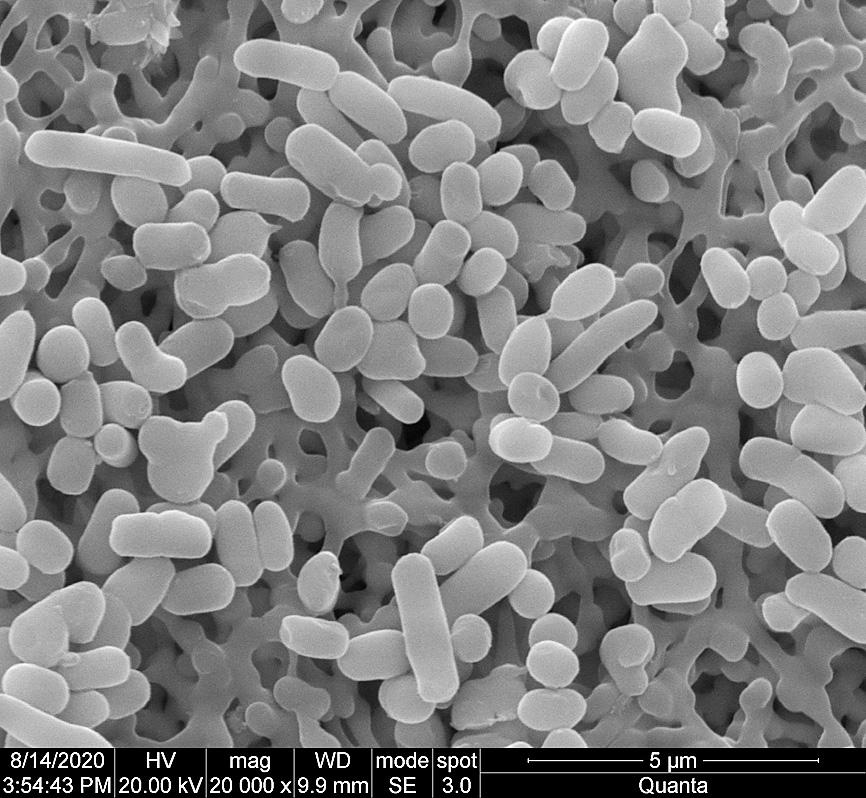Academia Sinica President James Liao (廖俊智) and a research team yesterday said that they have developed the world’s first synthetic bacterial strain that can convert methanol into valuable chemicals, signaling new possibilities for recycling carbon.
Team members shared their findings at a news conference at the institution in Taipei, after their paper, titled “Converting Escherichia coli to a Synthetic Methylotroph Growing Solely on Methanol,” was published in the journal Cell on Monday last week.
Some bacteria in nature, namely methanotrophs, can convert methane — a greenhouse gas — into methanol and subsequently utilize methanol as a food source, but current scientific techniques could not easily modify its DNA to produce valuable products, said Frederic Chen (陳育孝), the lead author of the paper.

Photo courtesy of Academia Sinica
Chen said that he just last week finished his doctorate defense with the University of California, Los Angeles, where he was Liao’s student.
While existing industrial techniques can convert methane into methanol, they require large amounts of electricity to produce high pressures and temperatures of up to 500°C only to produce low-value industrial products, he said.
Scientists have been hoping to develop a synthetic methylotroph since the idea was broached more than a decade ago, and the Academia Sinica team is the first to succeed in the effort, Chen added.
The team achieved the result by identifying the key enzymes regulating E. coli through a metabolic prediction model and reprogramming E. coli into a synthetic methylotrophic strain through genome editing tools and artificial evolution, he said.
The technique can convert methanol into valuable chemicals, medicines, and fuels, forming a carbon cycle with high green economic value that can help with carbon reduction, he added.
The new strain only possesses three foreign genes different from ordinary E. coli and can be cultivated at a temperature of 37°C, he added.
The research was conducted by Academia Sinica members, Liao said, adding that electron microscopy, proteomics and three different gene sequencing techniques were keys to characterizing the synthetic strain.
All techniques applicable to ordinary E. coli would also be applicable to the synthetic strain, he said.
The journal’s reviewers hailed the findings as “setting the new standard for synthetic biology,” Chen said.
While they are using methanol as the feedstock and the synthetic bacteria as a biocatalyst, they hope to make the strain able to feed on carbon dioxide and methane in a bid to alleviate greenhouse effects, Chen added.

Beijing could eventually see a full amphibious invasion of Taiwan as the only "prudent" way to bring about unification, the US Department of Defense said in a newly released annual report to Congress. The Pentagon's "Annual Report to Congress: Military and Security Developments Involving the People's Republic of China 2025," was in many ways similar to last year’s report but reorganized the analysis of the options China has to take over Taiwan. Generally, according to the report, Chinese leaders view the People's Liberation Army's (PLA) capabilities for a Taiwan campaign as improving, but they remain uncertain about its readiness to successfully seize

Taiwan is getting a day off on Christmas for the first time in 25 years. The change comes after opposition parties passed a law earlier this year to add or restore five public holidays, including Constitution Day, which falls on today, Dec. 25. The day marks the 1947 adoption of the constitution of the Republic of China, as the government in Taipei is formally known. Back then the Chinese Nationalist Party (KMT) governed China from Nanjing. When the KMT, now an opposition party in Taiwan, passed the legislation on holidays, it said that they would help “commemorate the history of national development.” That

Taiwan has overtaken South Korea this year in per capita income for the first time in 23 years, IMF data showed. Per capita income is a nation’s GDP divided by the total population, used to compare average wealth levels across countries. Taiwan also beat Japan this year on per capita income, after surpassing it for the first time last year, US magazine Newsweek reported yesterday. Across Asia, Taiwan ranked fourth for per capita income at US$37,827 this year due to sustained economic growth, the report said. In the top three spots were Singapore, Macau and Hong Kong, it said. South

HORROR STORIES: One victim recounted not realizing they had been stabbed and seeing people bleeding, while another recalled breaking down in tears after fleeing A man on Friday died after he tried to fight the knife-wielding suspect who went on a stabbing spree near two of Taipei’s busiest metro stations, Taipei Mayor Chiang Wan-an (蔣萬安) said. The 57-year-old man, identified by his family name, Yu (余), encountered the suspect at Exit M7 of Taipei Main Station and immediately tried to stop him, but was fatally wounded and later died, Chiang said, calling the incident “heartbreaking.” Yu’s family would receive at least NT$5 million (US$158,584) in compensation through the Taipei Rapid Transit Corp’s (TRTC) insurance coverage, he said after convening an emergency security response meeting yesterday morning. National